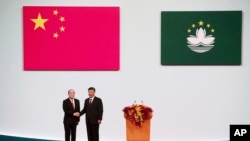China is tightening its grip on Macao, having incorporated the former Portuguese colony into a cooperation zone with Guangzhou, capital of China’s Guangdong province, clamped down on casinos and manipulated a local parliamentary election.
China’s hard-line approach in Macao is widely seen as part of a larger campaign to regain central control over society and business across the country.
Macao, like Hong Kong, is a “special administrative region” of China and supposed to have a high degree of autonomy under the “one country two systems” framework.
But it has now been paired with neighboring Guangdong in a special economic zone on nearby Hengqin island, with special tax and other policies aimed at diversifying Macao’s economy away from gambling into such industries as finance, high-tech, traditional Chinese medicine, tourism, exhibition and trade.
“It was never the intention [of China] for gaming to dominate Macao’s economy, and worse, for the SAR to become so totally dependent on the mainland for its economic welfare,” Macao-based casino consultant Ben Lee told VOA, by email.
China has recently exerted its control over the casino businesses in the world’s biggest gambling hub. The Macao government announced a regulatory overhaul that could see local officials supervising companies in the city, including introducing government representatives at casino operators.
Gambling business shares plummeted in mid-September by as much as a third of their value, according to Reuters.
The new measure aims to limit the number of approved licenses and involve government supervisory officials in casino operations. The city’s cash flow to the United States, as half the of the six casino operators in Macao are owned by U.S. corporations, has propelled Beijing’s tightened scrutiny on the gambling industry, Lee added.
“Macao had a runaway gaming industry in 2013 and again in 2019 with gross gaming revenues of US$45 billion and US$37 billion respectively,” Lee wrote. “This represents money that flowed out of the Chinese economy into and from Macao, a significant proportion of that to the US of all places.”
Earlier this month, a new border checkpoint between Macao and Guangdong opened, seeking to facilitate travel between the two regions, the Chinese Communist Party’s newspaper Global Times reported.
With a diminished casino business, Macao might have to start investing in non-gambling pursuits.
“We don’t really have any core competencies apart from the gaming industry which in turn is wholly reliant on the China market. What we do have is capital and the attraction of the gaming concessions to bring the big pocketed investors to inject capital in other non-gaming initiatives which will likely be part of the terms of the new concessions,” Lee wrote.
On top of establishing a cooperation zone and diminishing gambling businesses, Macao also saw the first disqualification of opposition candidates in a parliamentary election this year.
The Macao government disqualified 21 pro-democracy candidates in July, on the grounds they “had not upheld the Basic Law of the Macao SAR, or they had not met the requirement of pledging allegiance to” Macao. It was the first time the city direct election candidates were disqualified.
Macao Chief Executive Ho Iat Seng stressed that lawmakers have to be “strictly adhering to the fundamental principle of patriots governing Macao.”
The three banned parties appealed the decision in court but failed to regain the rights to run.
The mid-September Legislative Assembly election witnessed the lowest voter turnout, 42%, since the city’s 1999 handover to China.
The Electoral Affairs Committee chairman reportedly claimed the record low turnout stemmed from the global pandemic and the typhoons, and denied the disqualification of the opposition candidates affected the low turnout.
Michael C. Davis, professor of law and international affairs at Jindal Global University in India and a global fellow at the Wilson Center, attributed the low turnout to Beijing’s crackdown on opposition.
“This is clearly a problem of Beijing’s growing interference, to eliminate opposition,” Davis told VOA. “A number of opposition candidates were disqualified, and the voters are no doubt fed up and judge it really not worthwhile to vote in elections with no real choice.”
The European Union issued a statement in July that called the disqualification “a detrimental step that runs counter to the rights guaranteed in Macao’s Basic Law.” U.S. State Department spokesperson Ned Price tweeted his support for the EU’s stance on the matter.
The Macao government rebuked the critical remarks and reiterated that the election was “purely an internal affair of Macao” and condemned the outside interference.
“Beijing has turned to more repressive policies in the past couple years … [it] likes to say that the opposition has undermined the system and threatened China’s national security,” Davis said.











